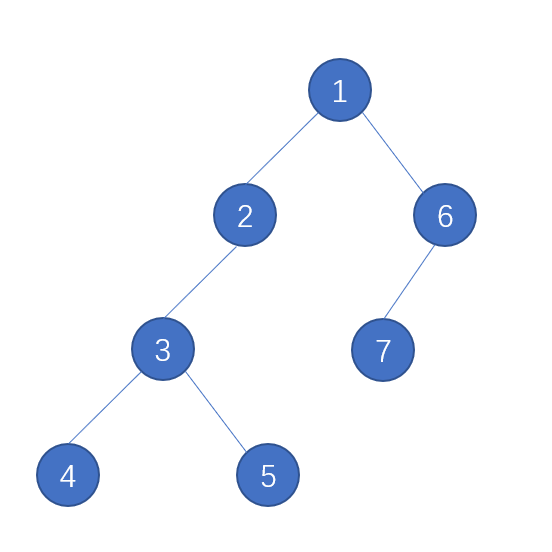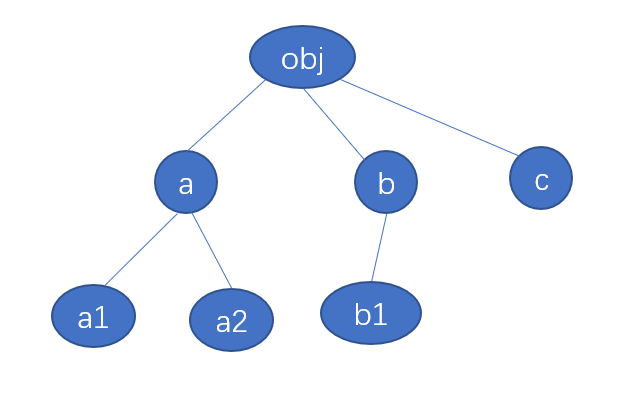js - 深拷贝非递归实现
# 深度优先 DFS
对于二叉树的深度优先算法,遍历顺序如下图所示:

对应递归版本的代码实现如下:
function dfs(root) {
visit(root)
if (root.left) {
dfs(root.left)
}
if (root.right) {
dfs(root.right)
}
}
2
3
4
5
6
7
8
9
对于非递归版本而言,我们需要借助栈来实现:
function dfsNonRecursive(root) {
const stack = [root]
while (stack.length) {
const node = stack.pop()
visit(node)
if (node.right) {
stack.push(node.right)
}
if (node.left) {
stack.push(node.left)
}
}
}
2
3
4
5
6
7
8
9
10
11
12
13
注意:这里需要先将右结点推入栈中,再将左节点推入栈中,这与栈的工作原理有关,也就是先进后出。
了解了深度遍历的原理后,我们就可以开始写我们的深拷贝代码了。 由于 JavaScript 中的对象子节点可能不只有一个,所以我们需要 将所有的子节点推入到栈中,而且同上面二叉树的深度遍历类似,我们 需要先将右结点推入栈中。
参考下面的例子:

我们要推入栈的顺序如下:
当 a 出栈时,由于 obj.a 为引用类型,根据深度优先算法,
我们需要将 a 的子节点也推入栈中:
注意:还是需要先将右结点推入到栈中。
为了方便操作,我们用 src[key] 保持当前要拷贝的对象,具体代码如下:
function isObject(obj) {
return typeof obj === 'object' && obj !== null
}
/**
* 深度优先非递归实现
* 这里只针对 Array 和 Object 的拷贝
* @param {*} obj
*/
export function deepCopyDFS(obj) {
// 对于非对象类型,直接返回
if (!isObject(obj)) {
return obj
}
// Map<src, dest>:为了避免循环引用
const seen = new Map()
seen.set(obj, obj)
const result = Array.isArray(obj) ? [] : {}
const stack = [[obj, result, null]]
// 以上面的对象为了: obj = {a: {a1: 1, a2: 2}, b: 1, c: {c1: 1}}
while (stack.length) {
const [src, dest, key] = stack.pop()
// 相当于遍历根结点: 此时栈中的数据为
// top
// | |
// | |
// | [src, dest, 'a'] |
// | [src, dest, 'b'] |
// | [src, dest, 'c'] |
// ------------------------
if (key === null) {
const keys = Object.keys(src)
for (let i = keys.length - 1; i >= 0; i--) {
stack.push([src, dest, keys[i]])
}
// 对于 key 的判断,例如:obj.a
} else if (isObject(src[key])) {
// 需要判断是否已经遍历过,避免循环引用
if (seen.has(src[key])) {
dest[key] = seen.get(src[key])
} else {
// 对于引用类型,再次将子节点推入栈中
dest[key] = Array.isArray(src[key]) ? [] : {}
stack.push([src[key], dest[key], null])
}
} else {
// 对于基本数据类型,直接添加即可
dest[key] = src[key]
}
}
return result
}
2
3
4
5
6
7
8
9
10
11
12
13
14
15
16
17
18
19
20
21
22
23
24
25
26
27
28
29
30
31
32
33
34
35
36
37
38
39
40
41
42
43
44
45
46
47
48
49
50
51
52
53
54
55
需要注意的是,将所有的子节点推入到栈中对应的代码为 for (let i = keys.length - 1; i >= 0; i--) {}。
# 广度优先 BFS
广度优先算法其实和深度优先算法类似,只不过我们采用的队列去实现,而不是栈。 同时,子节点入队的顺序也将改为从左结点开始。对应代码如下,注意高亮部分:
export function deepCopyBFS(obj) {
if (typeof obj !== 'object' || obj === null) {
return obj
}
const result = Array.isArray(obj) ? [] : {}
const queue = [[obj, result, null]]
const seen = new Map()
seen.set(obj, obj)
while (queue.length) {
const [src, dest, key] = queue.shift()
if (key === null) {
Object.keys(src).forEach(key => {
queue.push([src, dest, key])
})
} else if (isObject(src[key])) {
if (seen.has(src[key])) {
dest[key] = seen.get(src[key])
} else {
dest[key] = Array.isArray(src[key]) ? [] : {}
queue.push([src[key], dest[key], null])
}
} else {
dest[key] = src[key]
}
}
return result
}
2
3
4
5
6
7
8
9
10
11
12
13
14
15
16
17
18
19
20
21
22
23
24
25
26
27
# 测试
import { deepCopyBFS, deepCopyDFS } from '.'
describe('deepCopy', () => {
let keys = []
const a = new Proxy(
{ a1: 1, a2: 2 },
{
get(target, key) {
if (!keys.includes(key)) keys.push(key)
return Reflect.get(target, key)
},
},
)
const b = 1
const c = new Proxy(
{ c1: 1 },
{
get(target, key) {
if (!keys.includes(key)) keys.push(key)
return Reflect.get(target, key)
},
},
)
const proxy = new Proxy(
{ a, b, c },
{
get(target, key) {
if (!keys.includes(key)) keys.push(key)
return Reflect.get(target, key)
},
},
)
beforeEach(() => {
keys = []
})
describe('DFS non-recursive implementation', () => {
it('should perform the correct deepCopy function', () => {
// TODO: add test
expect(deepCopyDFS(null)).toEqual(null)
function func() {}
expect(deepCopyDFS(func)).toEqual(func)
expect(deepCopyDFS([1, 2, 3, { a: 1 }])).toEqual([1, 2, 3, { a: 1 }])
const obj1 = { a: 1, b: 1, c: [1, 2] }
const copiedObj1 = deepCopyDFS(obj1)
expect(copiedObj1).toEqual(obj1)
copiedObj1.c.push(3)
expect(copiedObj1).not.toEqual(obj1)
})
it('should avoid cycle reference', () => {
const obj1 = { name: 'obj1' }
const obj2 = { name: 'obj2' }
// obj1.a = obj2, obj2.a = obj1
// cycle reference
obj1.a = obj2
obj2.a = obj1
const copiedObj1 = deepCopyDFS(obj1)
expect(copiedObj1).toEqual(obj1)
})
it('should perform DFS copy', () => {
deepCopyDFS(proxy)
expect(keys).toEqual(['a', 'a1', 'a2', 'b', 'c', 'c1'])
})
})
describe('BFS non-recursive implementation', () => {
it('should perform the correct deepCopy function', () => {
// TODO: add test
expect(deepCopyBFS(null)).toEqual(null)
function func() {}
expect(deepCopyBFS(func)).toEqual(func)
expect(deepCopyBFS([1, 2, 3, { a: 1 }])).toEqual([1, 2, 3, { a: 1 }])
const obj1 = { a: 1, b: 1, c: [1, 2] }
const copiedObj1 = deepCopyBFS(obj1)
expect(copiedObj1).toEqual(obj1)
copiedObj1.c.push(3)
expect(copiedObj1).not.toEqual(obj1)
})
it('should avoid cycle reference', () => {
const obj1 = { name: 'obj1' }
const obj2 = { name: 'obj2' }
// obj1.a = obj2, obj2.a = obj1
// cycle reference
obj1.a = obj2
obj2.a = obj1
const copiedObj1 = deepCopyBFS(obj1)
expect(copiedObj1).toEqual(obj1)
})
it('should perform DFS copy', () => {
deepCopyBFS(proxy)
expect(keys).toEqual(['a', 'b', 'c', 'a1', 'a2', 'c1'])
})
})
})
2
3
4
5
6
7
8
9
10
11
12
13
14
15
16
17
18
19
20
21
22
23
24
25
26
27
28
29
30
31
32
33
34
35
36
37
38
39
40
41
42
43
44
45
46
47
48
49
50
51
52
53
54
55
56
57
58
59
60
61
62
63
64
65
66
67
68
69
70
71
72
73
74
75
76
77
78
79
80
81
82
83
84
85
86
87
88
89
90
91
92
93
94
95
96
97
98
